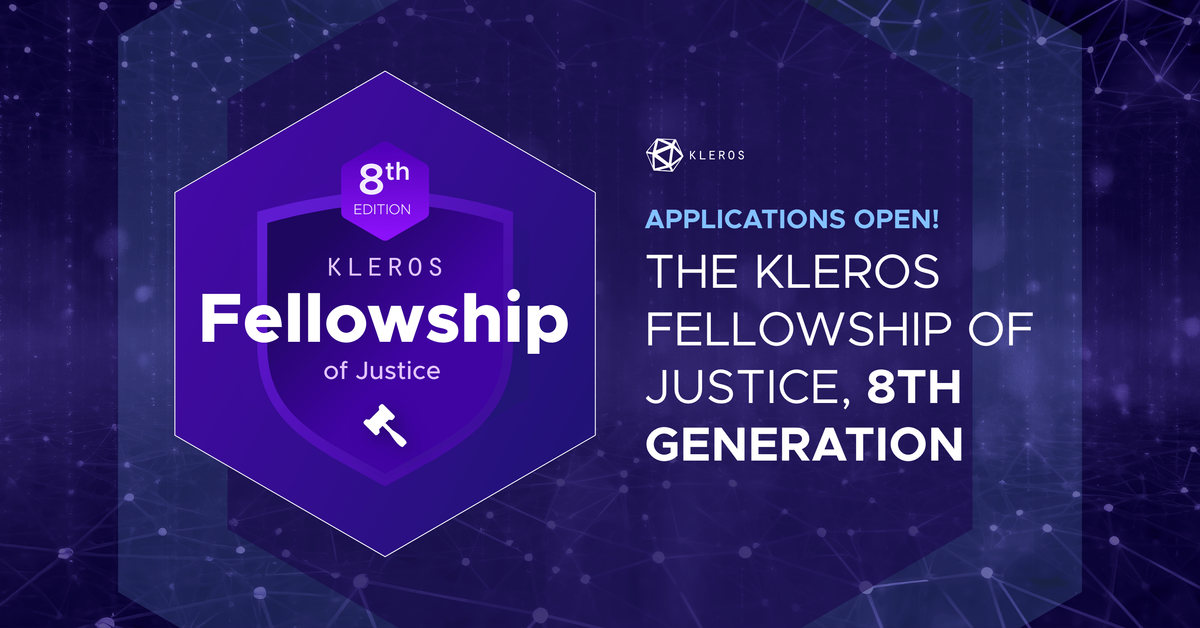The Kleros Fellowship of Justice, 8th Generation: Applications Open!

In August of 2018, we launched the Kleros Fellowship of Justice with the goal of creating a community of experts in the emerging field of decentralized justice.
In this six month-long program, participants from the fields of computer science, cryptoeconomics, law and business collaborate with core members of the Kleros team in conducting some type of work relevant to the advancement of decentralized justice.
Kleros is excited to announce a call for research proposals for the eighth cohort of our Fellowship! We invite innovative proposals across a range of fields, including e-sports, enterprise disputes, DAO governance, AI, and more. Check below for further details and apply by filling in the form.
Federico presenting on the use of Kleros for content moderation.
To learn more about Kleros's cryptoeconomic research challenges, read our Yellow Paper.
Fellowship Tracks
- Dispute Resolution in the eSports Industry. As the global eSports sector expands, traditional legal frameworks are increasingly challenged by its unique issues. Fellows are invited to propose research topics that may include both theoretical analyses of decentralized justice and practical applications of the Kleros model tailored to specific eSports scenarios.
- Consumer Dispute Resolution in Enterprises. This fellowship track explores the application of Kleros within enterprise settings to address consumer disputes. Fellows are encouraged to choose a topic that would investigate how Kleros can be integrated into sectors such as e-commerce, fintech, and insurance, addressing the "justice gap" in the digital economy, where conventional methods often fail. Fellows are invited to propose topics that explore the practical, legal, and operational aspects of deploying Kleros within enterprise settings.
- Governance. This fellowship track focuses on how Kleros can be effectively integrated into the governance structures of DAOs to enhance decision-making and dispute resolution. Participants will be encouraged to research strategies for utilizing Kleros to improve transparency, accountability, and efficiency within DAOs. Potential topics may include unique challenges of DAO governance, mechanisms for conflict resolution, voting processes, stakeholder engagement and more.
- Cryptoeconomics and Incentive Design. Exploring the design of economic incentives in decentralized networks, tokenomics, and the role of cryptoeconomics in ensuring fair and efficient governance. Potential research topics may include questions such as how different incentive structures, like staking, slashing mechanisms, or reward distributions, impact juror behavior.
- Artificial Intelligence in Dispute Resolution. AI can assist in evaluating evidence, predicting case outcomes, or even guiding jurors by highlighting relevant information, all while ensuring that the human element of justice is preserved. Suggested research topics may include but are not limited to: developing AI tools that could be integrated into Kleros’ arbitration process, exploring how AI can support jurors by analyzing case data and reducing biases as well as addressing ethical considerations of the use of the AI in blockchain-based dispute resolution systems like Kleros.
- Legal Integration of Decentralized Dispute Resolution Systems. This track explores how Kleros can be incorporated into conventional legal frameworks, including courts and arbitration systems. Key topics include the legal recognition of Kleros decisions, the potential for enforcement by state authorities, and the development of hybrid models that blend decentralized and traditional dispute resolution methods.
- Dispute Resolution in Social Media. Last but not least, this fellowship track focuses on exploring how Kleros can be applied to resolve disputes within social media platforms. Potential research topics include innovative ways to integrate decentralized dispute resolution mechanisms to address issues such as content moderation, user conflicts, and intellectual property claims.
Candidates will be accepted into the Fellowship based on the quality of their proposal. $1,000 in PNK will be paid to candidates upon the successful completion of the program.
Check the presentation by our Head of Research, William George, "Parameterization of Crypto-Economic Systems" at ETHCC 6 in Paris, 2023.
Want to apply but your interest doesn't fall in any of these categories?
The Fellowship also accepts candidates from other lines of research in law, business and computer science.
Some of the topics of import addressed by Fellows from previous cohorts are:
- Kleros: A Socio-Legal Case Study Of Decentralized Justice & Blockchain Arbitration by Luis Bergolla.
- Interactions between decentralized justice and artificial intelligence by Alexei Gudkov.
- Recognition and enforcement of Kleros awards under The New York Convention in developing areas by Jake Lowther.
- Accommodating Kleros as a decentralized dispute resolution tool for civil justice systems: theoretical model and case of application by Mauricio Virues.
- Dispute resolution in P2P renewable energy markets by Mauricio Duarte.
- Kleros for copyright disputes in digital environments by Paolo Archila.
On this page, you can access the research produced by participants of the previous editions of the program.
Why join the program? Check this post with a number of testimonials from previous participants.
Have a question? Feel free to email fellowship@kleros.io
Apply now and help build the future of decentralized justice!
